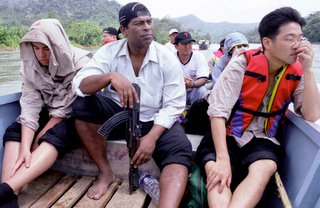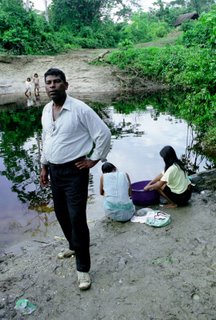

There is an entry wound in the middle of his front left shoulder. It is small and tidy, at least compared to the massive exit wound on his back, created when the hollow tipped bullet exploded on its way through his body. The steel plate in his head is the result of a terrorist’s bomb. Now in his forties, Felipe has been working for the Peruvian police for most of his life. Although a shaky peace has now been established in Peru, for the past 20 years the country was ravaged by violence. Rebels and terrorist groups controlled large portions of the countryside. Drug traffickers stalked the border areas. For Peruvian law enforcement violence was just a part of life.
Felipe has never been married. He spent much of his youth fighting against various terrorist groups and chasing drug lords. His size and menacing features make people respect and fear him. However, he is much kinder than he looks, and he is dedicated to his work. After suffering numerous wounds in the line of duty, training with the CIA’s counter-terrorism and narcotics agents, and receiving the rank of sergeant he was given a job with elite Segundo branch of the police force. Segundo is Peru’s version of the US secret service. They guard the president on his trips abroad, and are involved in counter intelligence programs throughout Peru. The agency is also responsible for guarding foreign diplomats and envoys that visit Peru. They provided security for Taiwan Root’s journey into the Amazon.
Upon arrival in any new village Felipe and his partner Jaime became the center of attention amongst the populace. The people knew and feared the reputation of Segundo. In a country with a history of violence like Peru’s it is sometimes difficult for the local population to determine who is more dangerous- the drug traffickers and terrorists or the police and the military. In order to calm the villagers Felipe always met with the chief to explain that he was only there to provide security for the doctors, not to cause any problems for the locals.
Inspired by the teachings of Mao Tse Tung, university professor Abimael Guzman founded the Shining Path in the 1960s. Although starting out as a political organization seeking greater power for peasants, by the early1980s the Shining Path had declared war on the government of Peru. Using assassinations and bombings, the 10,000 armed combatants of the Shining Path soon controlled large areas of the central Andes. During the Fujimori administration, the government regained control through brutal and repressive shows of military power. By the late 1990s, the Shining Path had dwindled to only a few hundred members, and violence now flares up only occasionally. More than 30,000 were killed during the 20 years of fighting. The vast majority of the dead were civilians.
No comments:
Post a Comment